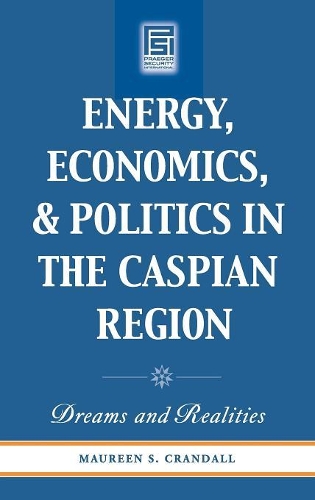
Energy, Economics, and Politics in the Caspian Region: Dreams and Realities
(Hardback)
Publishing Details
Energy, Economics, and Politics in the Caspian Region: Dreams and Realities
By (Author) Maureen S. Crandall
Bloomsbury Publishing PLC
Praeger Publishers Inc
30th June 2006
United States
Classifications
Tertiary Education
Non Fiction
327.58
Physical Properties
Hardback
264
Description
The potential of energy resources in the Caspian region (Azerbaijan, Kazakhstan, Turkmenistan, and Uzbekistan) has attracted much attention since the demise of the Soviet Union. Many industry analysts in the United States and other developed nations consider oil supplies from the Caspian a strong alternative to the Persian Gulf, and believe that a new reliance on its resources can reduce the perennial Western vulnerability to price increases and threatened cutoffs. But is the region capable of fulfilling that role The relatively low demand for natural gas worldwide, the transitory and often perilous political situation in the Caspian, and the uncertainty regarding the region's oil-producing capabilities in general make estimates of its potential to alleviate energy demands seem dubious. Maureen Crandall's revealing study of relevant economic and security issues clearly separates what can and cannot be expected from this strategically important, yet politically unstable region. In addition to examining the complex issues of cause and effect surrounding Caspian oil supply, Crandall examines the interests of neighboring states (Russia, Iran, and China), as well as those of the United States in the global search for resources. Figures, tables, and a bibliography complete a study that will prove of vital interest to regional security specialists, defense economists, energy analysts, environmentalists-and anyone else interested in Central Asia and the future of America's energy supplies.
Reviews
This volume's central theme is the legal status of the Caspian Sea relative to international designs on its role as a transit for the 200 billion barrels of oil reserved in the countries surrounding it. Crandall correctly notes that the Caspian region may potentially add more fuel to the flame of global and regional military, ethnic, and religious conflicts. Now, in addition to Russia and Iran, other countries such as Azerbaijan, Kazakhstan, and Turkmenistan are directly involved in such conflicts. Moreover, the dramatic rise of oil and gas consumption in China and India has increased their stakes in the region. Turkey also has been attempting to make independent claims and policies with respect to the Caspian region. Meanwhile, Western corporate interests there have become ever more vital, particularly for the US. Crandall tries to shed light on this complex matter, yet by and large she focuses almost exclusively on internal factors to explain the region's endemic corruption and abject poverty. However, she does not fully correlate the effects of global economic dynamics upon regional politics so as to show how Russia, China, and Iran are collectively trying to counter US influence over the Caspian region. Recommended. Comprehensive research collections. * Choice *
Crandall takes a close look at the countries surrounding the Caspian Sea for their potential as oil and gas producers, arguing that oil reserves and future production levels in the Caspian region have been overestimated. She examines the stakes involved, including forecast revenues and their potential uses, and discusses issues of governance affecting the disposition of these revenue streams. She also examines environmental considerations, local leadership, and the political situation in the region. * Reference & Research Book News *
Author Bio
Maureen S. Crandall is Professor of Economics in the Industrial College of the Armed Forces at the National Defense University in Washington, D.C. She spent a number of years in the U.S. intelligence community, where she won the Director of Central Intelligence's National Intelligence Medal of Achievement. She also served on the Nuclear Energy Research Advisory Commission at the U.S. Department of Energy, and on committees of the U.S. Association for Energy Economics. She is the author of numerous classified reports and briefings on energy, and has published several articles in defense and academic journals.
